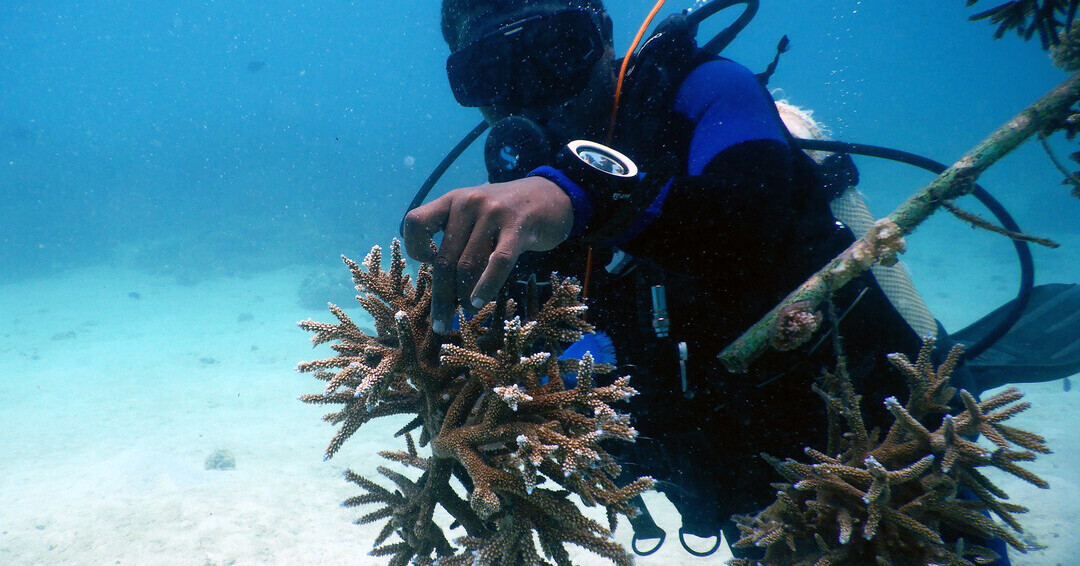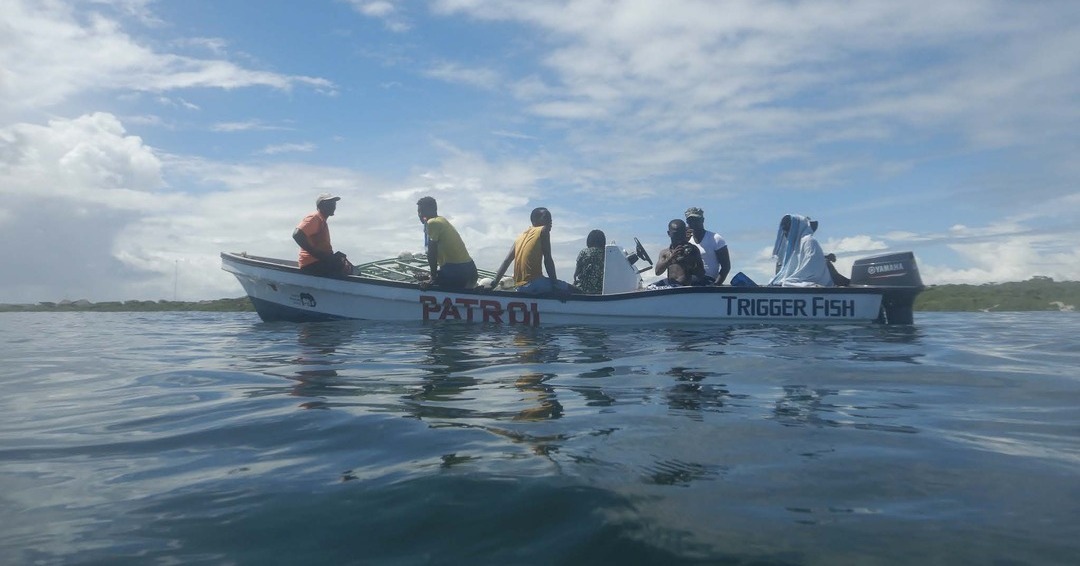Coral reefs are critical ecosystems that sustain marine biodiversity, protect coastlines, and support the livelihoods and food security of millions, particularly in the Global South. Despite these regions hosting the majority of coral reefs, research, funding, and decision-making capacity remain disproportionately concentrated in high-income countries. To address this imbalance, CORDAP released a detailed roadmap focused on building regional capacity and supporting community-driven innovation in the Global South.
The roadmap was co-authored by 35 scientists from 31 institutions worldwide. The workshop brought together diverse perspectives from representatives of academia, industry, conservation, restoration, and government from 19 low- and middle-income countries.
This final document includes a reflection of current challenges and identifies six priority areas requiring urgent action to enable a coordinated, inclusive, and lasting impact to secure a future for corals.

CORDAP hosted a four-day workshop in the large port city of Mombasa, Kenya from March 12th to 15th, 2024. Photo: CORDAP
How the resources’ imbalance perpetuates inequalities
Coral reefs serve as vital lifelines for coastal communities, offering sustenance, economic opportunities, and cultural significance to millions worldwide, but particularly in the Global South. Yet, they face unprecedented threats due to climate change, overfishing, pollution, habitat destruction among others. The need for science-based conservation and restoration efforts to safeguard coral reefs has never been more urgent. At the same time, conservationists in these regions face numerous challenges, including limited resources, lack of trained personnel, low access to technology, and scarce funding.
In fact, despite most coral reefs being located in low-and middle-income countries areas, governance, educational institutions, research facilities, technology, and funding mechanisms are predominantly concentrated in high-income nations outside beyond these limits. This geographical and economic disconnect perpetuates inequities in coral reef research and conservation. For instance, high-impact scientific publications predominantly emerge from institutions in developed countries, and much of this research remains inaccessible to the Global South due to paywalls.

A high-coral cover reef near Shimoni, Kenya in the early stages of bleaching as a result of prolonged high-temperature exposure (taken just after the Mombasa workshop in late March 2024, when the temperature was approximately 32 ºC). Photo: Anderson Mayfield
6 priority areas for investment in R&D to empower the Global South
Investing in the people doing the work is as crucial as investing in the conservation actions themselves. By investing in people, building regional capacity, and supporting community-driven innovation, we can unlock the potential for transformative change in coral reef conservation. This report identifies and characterizes six key priority areas currently hindering research and development in the Global South:
- Capacity Development
- Integrative Collaborations
- Project Management
- Facilities, Tools, Research, and Innovation
- Policy and Governance
- Funding

A coral restoration project led by REEFolution (Shimoni, Kenya). Photo: Ewout Geerten Knoester
1. Capacity Development
Capacity development is crucial in coral conservation as it equips local communities, scientists, and practitioners with the knowledge, skills, and tools necessary to manage and restore coral ecosystems effectively. By building technical expertise, fostering leadership, and promoting community engagement, capacity development ensures that conservation efforts are sustainable and resilient over the long term.
Key recommendations:
- Establish standardized training programs for practitioners
- Support long-term mentoring, exchange programs, and professional networks
- Increase access to scuba and fieldwork certifications
2. Integrative Collaborations
Coral conservation presents complex challenges that demand solutions extending beyond disciplinary and sectoral boundaries. Achieving effective and lasting outcomes requires bringing together governments, academia, non-governmental organizations (NGOs), local communities, and the private sector. Their collaboration ensures that conservation strategies are both scientifically rigorous and practically applicable.
Key recommendations:
- Facilitate multi-stakeholder partnerships (e.g., community, academia, government, private sector)
- Promote co-development of projects with local communities
- Stimulate equitable international collaborations

Two Reef Rangers recently trained by REEFolution Trust’s coral reef scientists to propagate adult corals in a local coral nursery in Southern Kenya. Photo: Ewout Geerten Knoester
3. Project Management
By establishing clear expectations and processes, project management fosters collaboration and minimizes misunderstandings, enhancing the collective impact of the initiative. Regular monitoring and reporting on project outcomes also help maintain transparency with stakeholders, secure continued funding, and demonstrate the impact of the project. Ultimately, effective project management increases the likelihood of achieving successful, long-term coral restoration outcomes.
Key recommendations:
- Provide training in proposal writing, budgeting, monitoring, and evaluation
- Develop accessible toolkits and templates for effective project implementation
- Support early-career professionals in managing restoration projects
4. Facilities, Tools, Research, and Innovation
Researchers in the Global South often face significant challenges due to limited access to essential facilities, tools, and cutting-edge methods, such as advanced genetic analysis, climate-resilient coral propagation, and advanced monitoring systems.
Additionally, researchers in developing nations often face barriers to accessing global scientific networks and knowledge-sharing platforms, further isolating them from technological advancements.
Key recommendations:
- Improve access to essential infrastructure (labs, nurseries, monitoring equipment)
- Support the development and transfer of context-appropriate technologies
- Fund innovation hubs in the Global South

Caribbean corals being fed a high-calorie diet to increase energy stores, which could allow them to better survive future heat waves. Photo: NOAA
5. Policy and Governance
Local governments play a central role in coral conservation efforts, as they are uniquely positioned to enable policy frameworks that ensure long-term sustainability. Involving policymakers from the outset ensures alignment between scientific objectives and policy priorities, facilitates knowledge transfer, and can drive regulatory innovations that support restoration (e.g., zoning for reef refugia, carbon offset frameworks, or legal recognition of restoration as a management tool).
Key recommendations:
- Encourage national and local governments to support reef restoration in policy agendas
- Promote inclusion of local/traditional knowledge in management plans
- Advocate for policies that enable community leadership and equitable benefit sharing
6. Funding
While the lack of funding is often cited as the primary barrier to conservation in the Global South, the challenge is more nuanced than simple resource scarcity. Many promising initiatives struggle not only due to insufficient funds, but also because of gaps in financial planning, grant-writing capacity, donor engagement, and mechanisms for equitable and transparent fund distribution.
Key recommendations:
- Create flexible, long-term funding models that support local leadership and continuity
- Include training and certification costs in grants
- Increase accessibility to funding for Global South institutions and community-based organizations
- Allocate funds for science communication and marketing

CORDAP REEFolution Trust volunteers (left) explaining their budget-friendly coral reef restoration approaches to local women of Shimoni, Kenya. Photo: Ewout Geerten Knoester
Broader considerations and conclusions
Building lasting capacity for coral restoration in the Global South requires sustained investment in local expertise, infrastructure, and inclusive knowledge-sharing networks. While external support and international collaborations play a vital role, long-term success depends on empowering local communities, researchers, and policymakers with the tools and resources needed to lead conservation efforts independently. This includes not only financial and technical support but also fostering an enabling environment where traditional and scientific knowledge are integrated, and decision-making is driven by those most directly affected by coral reef degradation. Strengthening regional networks and facilitating direct access to global scientific and policy platforms will ensure that restoration efforts are both context-specific and scalable.
Training programs, mentorship initiatives, and innovative funding mechanisms should be designed to reduce dependency on short-term external aid and instead build self-sustaining restoration frameworks. By investing in local capacity, bridging knowledge gaps, and advocating for stronger policy integration, we can enhance the resilience of coral reef ecosystems and the communities that depend on them. This roadmap serves as a call to action for governments, research institutions, and conservation organizations to commit to a long-term vision that places local capacity-building at the center of coral restoration in the Global South.
While this roadmap includes a range of recommendations to address the key challenges identified during the workshop, certain actions must be led by funding agencies and implementing organizations. These actions are focused on three broad categories (Funding, Platforms, and Training) and have the potential to create transformative and lasting change across coral reef conservation and restoration efforts in the Global South.
At CORDAP, we not only fund projects: we also promote capacity development and network opportunities. In 2025, we launched a funding call specifically for Global South scientists who may struggle to compete with the high-income country peers (CLIP), and we also require the involvement of Global South partners in our cornerstone funding scheme, the Coral Accelerator Program (CAP).

Community members of Lamu, Kenya constructing budget-friendly structures for deployment in local coral nurseries. Photo: : Juliet Karisa
We invite you to download and read the full R&D Technology Roadmap on Empowering oceans: Growing capacity in coral reef conservation and restoration in the Global South.
You can also learn more about our other scoping workshops and read our other roadmaps.
